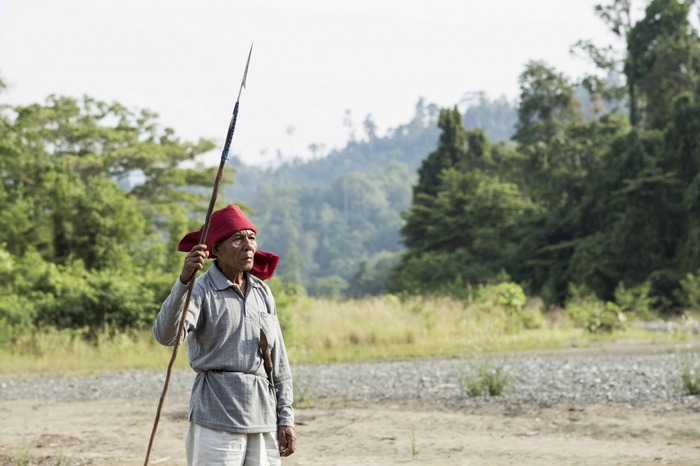
Footage has emerged of an uncontacted Indigenous ‘Tobelo’ tribe trying to warn away bulldozers that are destroying their native forests in Indonesia.
By
The human rights organization Survival International, who shared a video (below) which has since gone viral, declared it was ‘unequivocal proof’ of dangerous and invasive mining activity on Halmahera island.
The footage shows two men from the Hongana Manyawa tribe, one of the last nomadic hunter-gatherer tribes of the region, who live off the forest on Halmahera. They are filmed from the height of a bulldozer as they make gestures encouraging a presumed logging crew to leave the area.
A few seconds later, the bulldozer revs its engines, causing the two men to flee.
Survival International’s Director Caroline Pearce said: ‘This video documents a human rights catastrophe unfolding. It shows that the logging and mining operations on Halmahera are invading deep into the rainforests of the Hongana Manyawa.’
The charity is concerned that the removal of the forest for the mining of nickel could lead to the ‘potential genocide’ of the tribe.
Vast areas of Indonesian rainforest are set to be deforested under the directives of French, German, Indonesian and Chinese companies. The logging is a part of a billion-dollar project, backed by companies including Tesla, to transform Indonesia into a powerful nickel exporter for the electric vehicle market, where the material is used to make batteries, according to the NGO.
Weda Bay Nickel (WBN), a company primarily owned by the French mining company Eramet, has an agreement with the Indonesian government to mine parts of the Halmahera forest. Survival claims this includes a site close to where the footage was shot.
Sparsely populated Halmahera is the largest of the Maluku Islands – an isolated archipelago east of Sulawesi. Mining companies have started to exploit its rich deposits of nickel and cobalt in recent years.
Pearce said: ‘For many months, Survival has been warning Eramet, BASF and the electric car companies which need nickel for their batteries that continued mining in this area will destroy the uncontacted Hongana Manyawa, just as similar projects have destroyed other uncontacted peoples in other parts of the world. If they continue after seeing this video, it would be an act of stunning and brutal disregard both for international law and for human life.’
Under the UN Declaration on the Rights of Indigenous Peoples and Free, Prior, and Informed Consent companies and governments are legally required to gain indigenous people’s blessings for any industrial projects undertaken in their territories.
But the Hongana Manyawa tribe on Halmahera have made it clear that logging activity is an existential threat to their way of life.
‘If there is no more forest, then there will be no more Hongana Manyawa,’ a member of the tribe told the charity.

The approximately 300-500 members of the tribe, whose name translates as ‘people of the forest’, are reliant on the rainforest both culturally and for food and shelter. They set up temporary homes in one area of the forest where they hunt wild boar and deer and harvest sago trees. Then they move on, allowing the forest to regenerate.
Over the years, they have been subject to increasingly aggressive racial abuse and attempts to resettle tribes under the ideology of ‘civilising’ the tribes. Yet in cases where families have been re-homed by the Indonesian government, there have been catastrophic consequences, with contacted Hongana Manyawa people describing it as a ‘plague’ and a ‘prison’, according to the charity. The members are extremely vulnerable to diseases from wider society, making it all the more important that industrial activity stops venturing into their territory.
Pearce said: ‘These mining companies should stay out of the Hongana Manyawa’s land, period. We call upon the Indonesian government to urgently recognise and protect the Hongana Manyawa’s territory.’
When contacted by Geographical, Eramet said this: ‘The potential impacts of the mining activity on the Tobelo community have been a constant concern for Weda Bay Nickel. That is why we have been conducting our independent due diligence and have been supported by ethnological specialists to build culturally appropriate relationships with the O’ Hongana Manyawa people within our mining concession.
‘We are stunned by what the video is showing. This is not related to WBN mining or exploration activities. We are open to discuss with Survival International to clarify the facts, and make sure that WBN plays an active role to engage in culturally appropriate way with the O’ Hongana Manyawa people.’
But Callum Russell, the Asia research and advocacy Officer at Survival responded to their comments, saying: ‘The video was taken only around a day’s walk from the WBN concession and it features people directly affected by WBN.’
Only recently, Eramet claimed ‘there is no evidence suggesting that there would be uncontacted Forest Tobelo living in or around WBN’s concession.’ Yet documents obtained by Geographical indicate that the company has known of the presence of uncontacted tribes in the area since 2012.
Russel noted the irony of the danger to the indigenous people, who are famed for their reverence and guardianship of the Indonesian rainforests and are now threatened by an industry-related in most people’s minds to the ‘green transition’.
‘We should be supporting the indigenous people who are the guardians of the lungs of the planet such as the Hongana Manyawa. That’s how we need to be protecting biodiversity and protecting the earth from the catastrophic effects of climate change,’ he said. ‘We would urge everyone to stand in solidarity with the Hongana Manyawa people.’
Survival International say the public can support the campaign to stop these companies from razing the Halmahera forest by sending letters to the companies involved.
Tesla did not respond to a request for comment.




